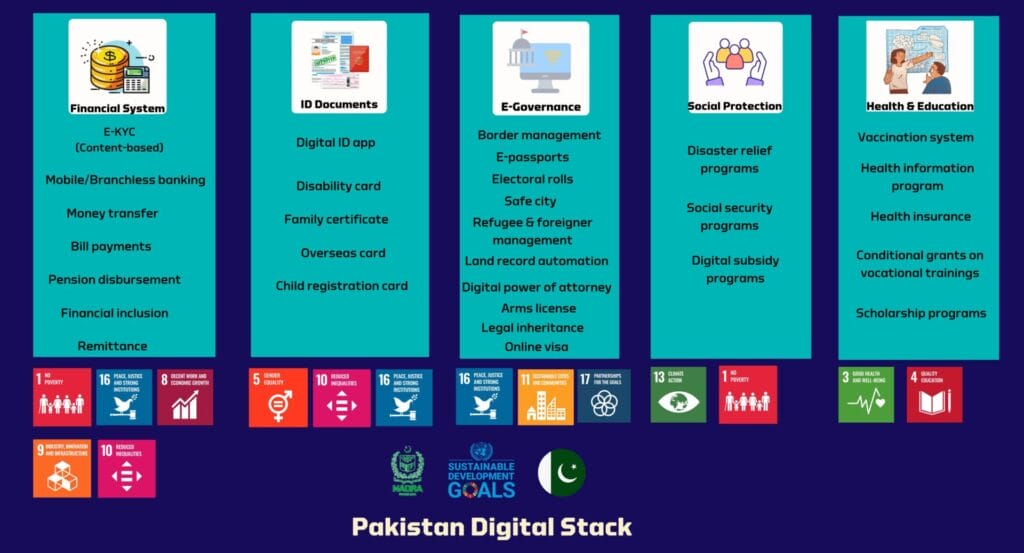The following report is by Tariq Malik, Technical Advisor Digital Public Infrastructure, Digital ID, World Bank, and Prerna Saxena, Head of Asia Pacific, UN-based Better Than Cash Alliance; published by the World Economic Forum:
History teaches us that even the simplest technological innovations can have the most profound consequences for society. From the railways to the internet, technologies have reshaped our lives. Today, digital public infrastructure (DPI) represents such a determining investment. In the case of Pakistan, the country has demonstrated its commitment towards digital transformation, marked by interventions in 2022.
On a scorching day with temperatures soaring to 42 degrees, Manzoora, a mother from the flood-stricken district of Shaheed Benazirabad, rural Sindh, Pakistan, made a significant leap: she withdrew cash from her own bank account for the very first time. This milestone was made possible through a mobile cash transfer programme initiated by the Sindh government, which partnered with digital service providers to empower citizens like Manzoora. This is just one example of how DPI is changing lives of millions of Pakistanis.

Pakistan’s Digital Transformation
At the heart of Pakistan’s digital transformation is the National Database and Registration Authority (NADRA), established to overhaul the country’s identity systems. This was a foundational change, positioning Pakistan among a select group of nations equipped to manage comprehensive digital identities for over 240 million citizens. The NADRA-issued Computerized National Identity Card (CNIC) is now a standard feature in every adult Pakistani’s life, facilitating a range of routine tasks such as opening bank accounts, purchasing airline tickets, acquiring driver’s licenses, and qualifying for social protection, thereby ensuring seamless identity authentication for every citizen.
Within four years of launching the Benazir Income Support Programme (BISP) – a social protection initiative to alleviate poverty – CNIC issuance to adults increased by 72%. Despite its head-start to similar digital identity (ID) initiatives in other countries, optimal use of NADRA’s digital database remains limited to only few ministries, department, agencies, and regulated businesses.
The Crucial Role Of Political Support And Legislation
The success of DPI hinges on enduring political commitment and robust legal frameworks that transcend electoral cycles. While the concept of citizen registration was embedded in Pakistan’s 1973 constitution, the integration of various national databases through the NADRA Ordinance 2000 and subsequent legislative enhancements in 2012 have been critical.
Pakistan’s Digital Initiatives
Pakistan’s journey toward effective DPI is characterized by the rollout of significant digital initiatives, such as, Contactless Biometric Verification App, Nishan Pakistan, and Pakistan Digital Census. While these prioritize long-term benefits, it is essential to achieve short-term wins to maintain engagement and support, preventing loss of momentum due to shifts in leadership or political will.
For instance, by integrating digital IDs with banking and telco services, the Asaan Mobile Account (AMA) scheme launched in December 2021, within the span of two years secured more than 10 million mobile accounts, with around 40% being women-owned.
Likewise, NADRA’s role in the RAAST payment system – a State Bank of Pakistan initiative – highlights how DPI can transform financial transactions. RAAST, an interoperable instant payment system, utilizes NADRA’s identity authentication processes to offer secure, swift KYC-compliant financial transactions across various platforms, thereby democratizing access to digital payments for millions.
Additionally, Pakistan’s DPI framework has also proven instrumental in managing crises, such as the COVID-19 pandemic. Within days of initiating the lockdown, Pakistan’s federal authorities announced unconditional cash transfers. The government provided approximately $75 per household, sufficient to purchase three months’ worth of food staples to 12 million vulnerable households.
The targeted response, facilitated by the robust digital ID infrastructure provided by NADRA, resonates strongly with the United Nations-based Better Than Cash Alliance’s 10-point action plan. This plan urges digitizing social benefits and providing women with Digital IDs, mobile phones, and internet access to advance financial equality.
The same approach is endorsed by a recent report on the Benazir Income Support Program (BISP), which highlights significant advancements in Pakistan’s digital delivery system.
These significant opportunities need to be informed and designed with guardrails to ensure that the deployment of DPI is safe, responsible, and leveraged for inclusive societies. The Universal Safeguards for DPI initiative, and the UN Principles for Responsible Digital Payments aim to create a practical framework for countries implementing such initiatives. This initiative identifies potential risks in global DPI deployments, providing valuable insights to inform the design and implementation of future safeguards.
For instance, in Pakistan, NADRA’s data sharing follows strict parliamentary processes. In national security cases, the crisis management cell within the Ministry of the Interior responsible for evaluation and requests of specific data fields. These standard operating procedures ensure case-by-case data sharing, a clear paper trail, and accountability to NADRA’s board.
The Future Of Pakistan’s Digital Economy
The potential of DPI to transform Pakistan’s economy and society is immense. With projections suggesting that wholesale adoption of digital payments could boost GDP by up to 7%.
Looking ahead, Pakistan is set to launch several ambitious DPI initiatives, including expanding the RAAST payment system, implementing a nationwide digital health records system, and launching a blockchain-based land registry. These projects promise to drive efficiency and transparency across multiple sectors, positioning Pakistan as a pioneer in the global digital landscape.
AUTHOR COMMENTARY
The WinePress has an ever-growing list of articles discussing digital ID implementation happening all around the world at a rapid pace. The future is here and now.
Digital IDs are needed to facilitate CBDCs and tokenization, so this is why you are seeing such a rapid forceful push for countries to accept and use them. Just because it is not really happening in the U.S. – yet – does not mean it is not happening right now elsewhere, so do not sleep on this and get haughty thinking the agenda is failing: that could not be farther from the truth.
[7] Who goeth a warfare any time at his own charges? who planteth a vineyard, and eateth not of the fruit thereof? or who feedeth a flock, and eateth not of the milk of the flock? [8] Say I these things as a man? or saith not the law the same also? [9] For it is written in the law of Moses, Thou shalt not muzzle the mouth of the ox that treadeth out the corn. Doth God take care for oxen? [10] Or saith he it altogether for our sakes? For our sakes, no doubt, this is written: that he that ploweth should plow in hope; and that he that thresheth in hope should be partaker of his hope. (1 Corinthians 9:7-10).
The WinePress needs your support! If God has laid it on your heart to want to contribute, please prayerfully consider donating to this ministry. If you cannot gift a monetary donation, then please donate your fervent prayers to keep this ministry going! Thank you and may God bless you.







